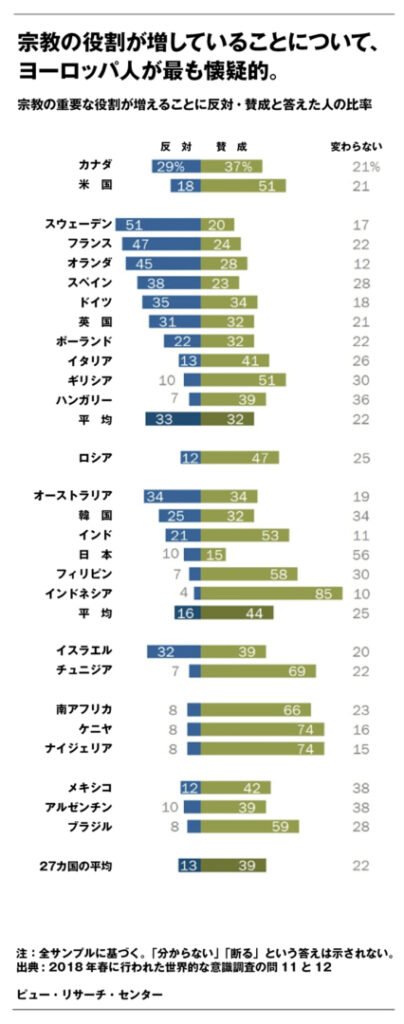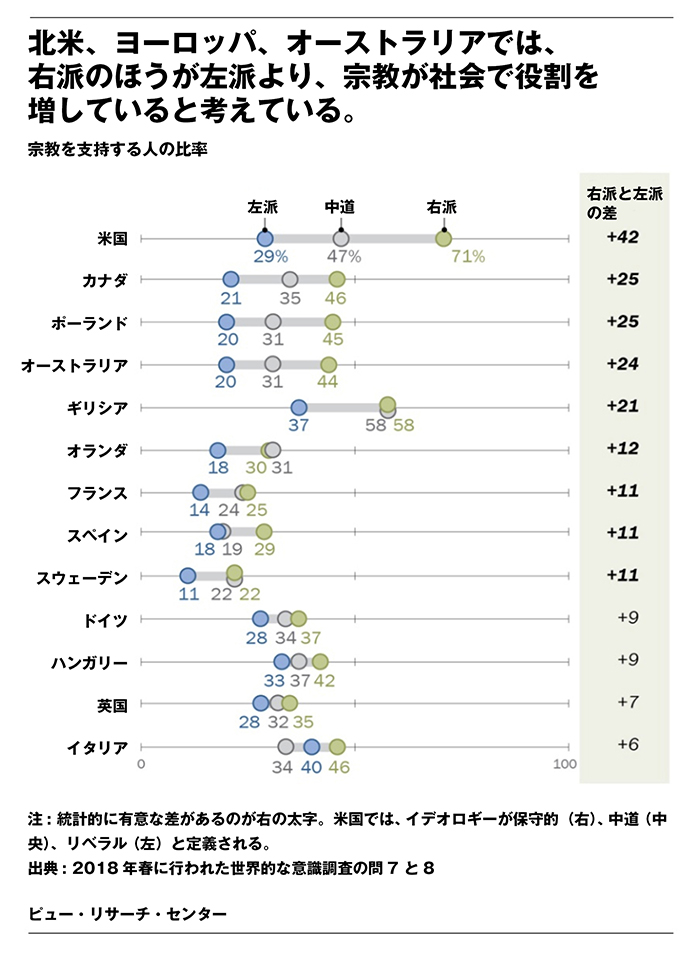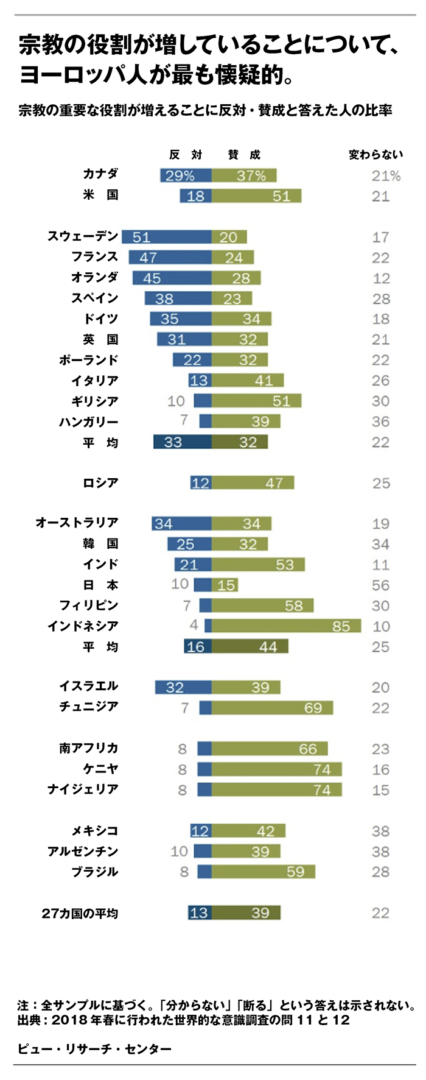[/st-mybox]
米国では世俗主義が強まる傾向があるにもかかわらず、宗教が社会に果たす役割が増すことに賛成する人が、反対する人よりも大きく上回っている。
[toggle]Despite signs of increasing secularism in the United States, far more Americans favor an increased role for religion in society than oppose it. [/toggle]27カ国3万人を対象にしたピュー・リサーチ・センターの最新のレポートによると、米国では、宗教がより重要な役割を果たすことに肯定的な人が51%、否定的な人は18%と、約3倍の差がついた。
[toggle]According to a massive new report from the Pew Research Center that queried more than 30,000 people across 27 countries, almost three times as many Americans say they would view “a more important role for religion” in the US as a positive change (51%) versus a negative change (18%).[/toggle]一般的にこの感情は、全世界的に同じ割合で共有されている。世界的調査において回答を得た39%のうち、半数が「宗教は社会にとってより重要だ」と答えたのに対し、「そう思わない」と答えた人はわずか13%だった。
[toggle]In general, that sentiment is shared around the globe—at the same rate. Across all countries surveyed, a median of 39 percent of respondents favor religion becoming more important in society, while only 13 percent oppose it. [/toggle]
「宗教が社会で重要な役割を果たす」という意見に反対する人が、賛成する人より多いのは、27カ国中わずか5カ国だった。スウェーデン(51%)、フランス(47%)、オランダ(45%)、ドイツ(35%)、スペイン(38%)。スペインでは昨年、無神論者を公言する人物(ペドロ・サンチェス)が首相に選ばれ、「公共機関から宗教的シンボルを排除する」、「学校教育のカリキュラムから宗教を廃止する」と宣誓して話題となった。
[toggle]Only 5 of the 27 countries surveyed have populations in which those opposed to religion playing a more important role outnumber those in favor. All 5 are in Europe: Sweden (51%), France (47%), the Netherlands (45%), Germany (35%), and Spain (38%), where an openly atheist prime minister was elected last year amid concerns over his vows to remove religious symbolism from institutions and religion from school curriculums. [/toggle]ナイジェリア、ケニア、南アフリカ、チュニジアのアフリカ諸国では、グローバル・サウス(おもに南半球に偏在している発展途上国)のインドネシアやブラジルなどとともに、「社会において宗教がより重要な役割を担う」という考えに国民の大多数が肯定的だ。
[toggle]In the African nations of Nigeria, Kenya, South Africa, and Tunisia, along with other countries in the global south such as Indonesia and Brazil, the idea of religion gaining more importance in society is viewed favorably by large majorities of the population. [/toggle]宗派間紛争で揺れ続けるナイジェリアについて、「宗教によって見解が異なる」とピュー・リサーチ・センターは報告している。
[toggle]Pew highlighted one country where views vary by religion: Nigeria, which continues to be rocked by deadly sectarian conflict. [/toggle]「宗教の重要性について肯定的なのは、ナイジェリアで大多数を占めるイスラム教徒も(88%)、次に多いクリスチャンも同様だ(61%)。しかしながら、『ナイジェリアで宗教の重要性はそれほど変化していない』と答えたクリスチャンはおよそ4分の1(26%)なのに対して、イスラム教徒は5%がそう答えた」と言う。
[toggle] “The vast majority of Nigerian Muslims (88%) are in favor of a more important role for religion, while a smaller majority of Christians (61%) say the same,” stated researchers. “However, it’s important to note that roughly a quarter of Christian respondents (26%) say there has been no change in the relative importance of religion in Nigeria, compared with 5% of Nigerian Muslims.” [/toggle]宗教的緊張や制約が世界的に高まり続ける中、その影響を受ける国の人々が、宗教が注目されることについてどう感じているか、ピュー・リサーチ・センターの最新レポートは垣間見せてくれる。
[toggle]With religious tensions and restrictions continuing to rise worldwide, as analyzed by Pew, this latest report offers a window into how citizens in affected nations feel about religion gaining prominence. [/toggle]イエスを信じることが危険な国のランキングを発表しているオープン・ドアーズによるリポート「ワールド・ウォッチ・リスト」(WWL)で、人口のおよそ半分がクリスチャンのナイジェリアは今年12位だった。ナイジェリア国民の65%は「国内で宗教が重要性を増している」と答え、74%は「さらに大きな役割を果たすことを期待している」という。
[toggle]Nigeria, where approximately half the population identifies as Christian, is ranked No. 12 on the 2019 World Watch List (WWL), a report from Open Doors ranking the countries where it is most dangerous to be a follower of Jesus. A full 65 percent of all Nigerians say religion is gaining importance in their country, and 74 percent favor it taking on an even greater role. [/toggle]クリスチャンが人口の5%未満というインドは10位で、国民の半数が「宗教の重要性が増している」と答え(54%)、半数が「今後も増すだろう」と考えている。(53%)。
[toggle]In India, ranked No. 10 on the WWL and where Christians comprise less than 5 percent of the population, half of all Indians say religion has grown more prominent in their society (54%) and half favor its continued rise (53%).[/toggle]インドネシアは最も顕著だ。WWLでは30位であり、国民の83%が「過去20年間に宗教の重要性が高まった」と答えている。「重要性が薄れた」と答えた人はわずか6%。「もっと大きな役割を担ってほしい」と考える人は85%で、他国と比べて突出している。「減少してほしい」と考える人はわずか4%。
[toggle]Indonesia may present the starkest case. Ranked No. 30 on the WWL, 83 percent of all Indonesians say religion has taken on more importance in the last 20 years. Only 6 percent say religion has faded. In the island nation, 85 percent want religion to continue to ascend to a more prominent place, the greatest percentage of any nation measured. Only 4 percent would like to see religion in society scaled back. [/toggle]「宗教にさらに大きな役割を果たしてほしい」と考えるかどうかは、特に北米、ヨーロッパ、オーストラリアでは、政治的イデオロギーと関連している。
[toggle]Especially in North America, Europe, and Australia, whether or not people want to see religion take on a more significant role in society is strongly linked with another social factor: political ideology. [/toggle]
宗教の役割が増えるのに賛成の人のうち、どちらかと言えば保守的、または非常に保守的と考える人と左派の人の差は、米国では42%。調査国のうち、政治的に右派か左派かで、最も隔たりがある。
[toggle]Americans who identify as somewhat or very conservative, for instance, are 42 percentage points more likely that left-leaning Americans to favor an increased role for religion in society. That is by far the largest political divide between the political right and left across all countries measured. [/toggle]カナダとポーランドはそれに次いで政治的分断が大きいが、宗教が大きな役割を果たすことに賛成する保守的な人は25%で、左派の人より数字が大きい。(後編に続く)
[toggle]Canada and Poland exhibit the next-largest political divides, with conservatives favoring a larger role for religion at a rate 25 percentage points higher than the political left. [/toggle]
